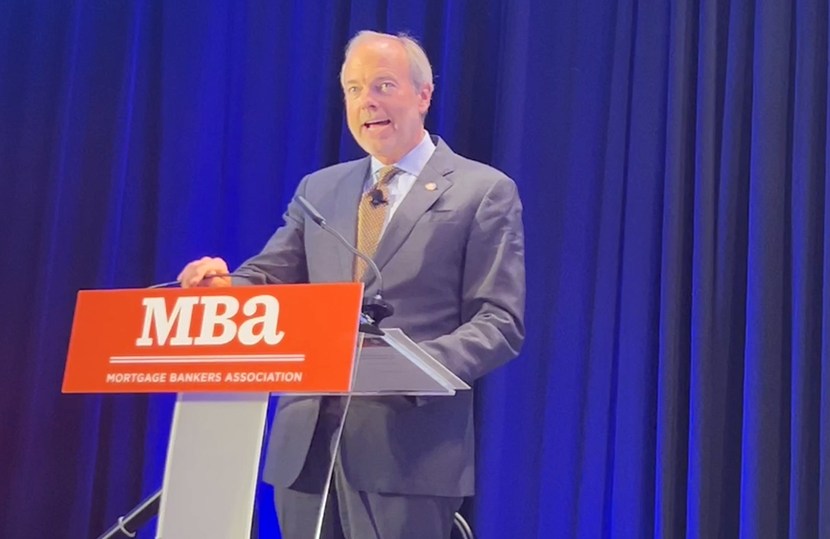
MBA’s Bob Broeksmit Provides Updates on GSE Reform, Bevy of Regulatory Issues

(Bob Broeksmit, by Anneliese Mahoney)
WASHINGTON–Perhaps the biggest issue on the horizon for the U.S. mortgage market is the future of the GSEs, said Mortgage Bankers Association President and CEO Bob Broeksmit, CMB, at the MBA Compliance and Risk Management Conference Sept. 29.
But in Washington, MBA has been hard at work communicating its core principles concerning the future of the GSEs to a wide variety of federal government stakeholders, Broeksmit noted.
In the past few weeks, MBA officials have participated in roundtable discussions on the topic at the Treasury Department and at the Federal Housing Finance Agency.
“One of these principles is that competition is good,” Broeksmit said. “We need two–or at least two–GSEs. Competition is a basic feature of our highly successful housing finance system.”
Among other principles are that any next moves must preserve what already works, doing no harm to liquidity, the TBA market and mortgage spreads; that there’s the need for a strong regulator; that clarity on the federal backstop is necessary; and that any GSE reform should be holistic and encourage more private capital.
Broeksmit noted the majority of members of Congress–and their staffers–were not on Capitol Hill when conservatorship started or during past attempts at ending conservatorship. So, education and engagement are key.
“MBA stands ready to work with the administration and Congress on freeing Fannie and Freddie from conservatorship, but MBA will take a back seat to no one in insisting that it is done the right way and does not disrupt the critical role they play in the U.S. housing finance system,” stated Broeksmit.
While GSE reform is one of the hottest topics in Washington related to the housing finance market, it’s far from the only key issue.
MBA has had a “stunning run of victories on Capitol Hill,” Broeksmit said, among those the Homebuyers Privacy Protection Act–referred to as the trigger leads bill–becoming the law of the land. And, President Donald Trump has officially signed the VA Home Loan Program Reform Act, restoring the Department of Veterans Affairs’ authority to offer partial claims and permit homeowners to move missed payments to the end of the loan term.
There were also plenty of victories for the industry in the One Big Beautiful Bill Act, including the preservation and/or enhancements of key elements of the 2017 Tax Cuts and Jobs Act.
Looking to the executive, about nine months into the second Trump Administration, MBA has welcomed a pivot away from regulatory overreach. But, it has also made the case for maintaining adequate staffing and sufficient expertise within government agencies to ensure successful housing policies continue and reforms are carried out with minimal disruption to all industry stakeholders, he said.
For example, another hot topic has been the future of the Consumer Financial Protection Bureau. Earlier this year, Acting Director Russell Vought sent a memo to CFPB staff directing them to focus on remediating actual consumer harm, not compliance with rules or enforcement actions to create new compliance obligations.
“MBA strongly supports checking the bureau’s regulatory excess,” Broeksmit said. “At the same time, we have advised that gutting the bureau would have unintended consequences. The fact is that Dodd-Frank remains the law of the land. Lenders and servicers must adhere to it. Even if federal enforcement wanes, state attorneys general can enforce its provisions, as can the plaintiffs’ bar with a private right of action.”
“The right rules provide a measure of certainty for lenders and borrowers,” Broeksmit continued. “The wrong rules–or no rules at all–do the opposite.”
In addition, the administration’s recently released regulatory agenda includes a Notice of Proposed Rulemaking to reform the loan officer compensation rule, a top MBA priority. MBA will continue to press for its desired changes on that front, Broeksmit said.
MBA is also engaged on other aspects of the administration’s regulatory agenda. Those include rescissions of the CFPB’s nonbank registry rule and FHFA’s fair lending, fair housing and equitable housing finance plan rule.
The association will also be keeping an eye on issues such as a new proposal related to the FHFA counterparty rule; the CFPB’s efforts to streamline loss mitigation rules under Reg X, a possible rescission of HUD’s Federal Flood Risk Management Standard and banking agency proposals dealing with risk-based capital and Community Reinvestment Act.
Credit scoring has also been an oft-discussed topic in the industry, particularly after FHFA Director Bill Pulte’s announcement a few months ago regarding Fannie Mae and Freddie Mac being able to use VantageScore 4.0.
“Creating competition in the credit scoring space has long been an MBA priority,” Broeksmit said. “Since the announcement, MBA has been in the trenches with FHFA staff and the leadership at Fannie and Freddie, to address the key implementation issues needed to move this forward.”
MBA doesn’t just have its eyes on federal matters, Broeksmit stressed; the association has been working on efforts in state capitals and courts. For example, MBA has filed briefs in multiple lawsuits challenging New York’s Foreclosure Abuse Prevention Act, arguing that retroactive application of the act violates the New York and U.S. constitutions.
And, the association is of course keeping an eye on a potential, looming government shutdown, Broeksmit said, noting it would be disruptive for the industry in a variety of ways, but that MBA is continuing to work with lawmakers and agency officials on the matter.
